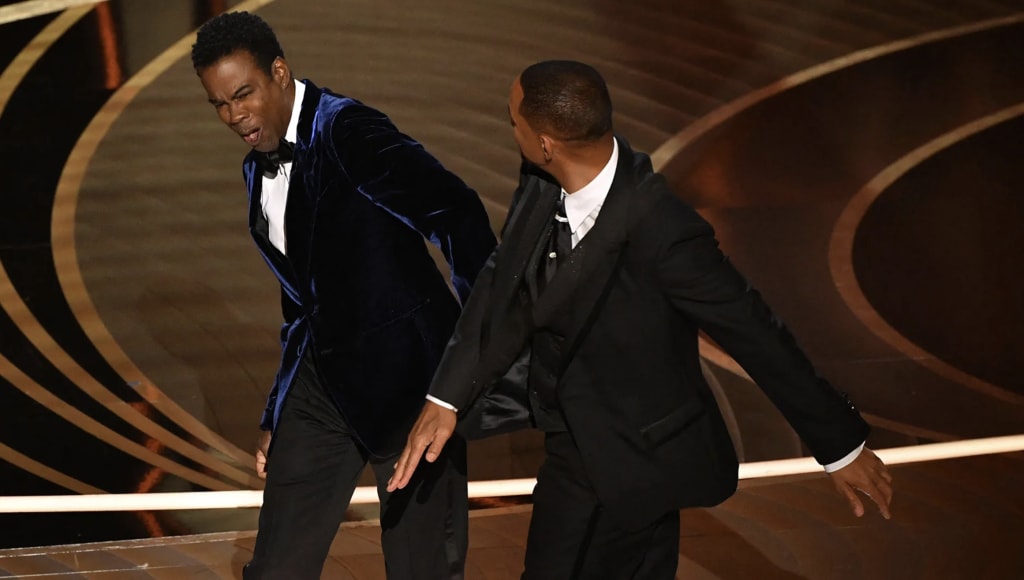
On Sunday, March 27th, the 94th annual Oscar ceremony took place. During one of the segments, famous comedian Chris Rock was asked to introduce the nominees for one of the categories. During his short speech, he made a joke about Jada Pinkett Smith and as a result, Will Smith walked on stage and slapped Chris Rock in the face. Here is a video of what happened if you haven't seen it yet.
The joke was “Jada, I love ya, G.I. Jane 2, can’t wait to see it.” This was a joke made in reference to her lack of air, which she had shared on social media is due to alopecia.
Introduction to Intersectionality

Intersectionality is a sociological concept that is defined by The Oxford Dictionary as:
“the interconnected nature of social categorizations such as race, class, and gender as they apply to a given individual or group, regarded as creating overlapping and interdependent systems of discrimination or disadvantage.”
To simplify, this means that categorizations like race, class, and gender, all work together to determine an individual’s experiences in society. An example of this is how a rich white man will face less discrimination than a poor Black woman. However, a rich Black man could face fewer societal disadvantages than a poor white woman. Intersectionality is a concept that affects everyone and many situations, even when the issues don’t seem to be related to race, class, or gender.
Based on these three main factors of intersectionality (race, class, and gender), I am going to list three common points I have seen across the internet regarding each one in order to further dig into the event itself.
Disclaimer: The following will put generic arguments, like "violence is never the answer" aside, as the main focus is how intersectionality plays a role in many people's arguments.
- Sidebar -
Before I begin, if you'd like more context about alopecia, the article I have linked in the caption for the image below gives a brief definition and more details about Jada Pinkett Smith's journey with it.

- End of Sidebar -
Race
Point #1: Will Smith's violent reaction further enforces stereotypes revolving around Black men and aggression.
Point #2: Chris Rock has made a documentary about Black women and their complicated relationship with hair (Good Hair, 2009), so it was wrong and weird to make that joke (even if he didn’t know about Jada Pinkett Smith’s alopecia).
Point #3: As the majority of the audience was white, the audience didn't fully understand how the joke's real effect.
Class
Point #1: In an event full of high-class individuals, the expected behavior of the audience was to remain classy and civil to jokes, even offensive ones, in a professional manner.
Point #2: As Will Smith is a well-known famous and rich man, he was able to escape immediate consequences.
Point #3: However, because they have such a public platform, Will and Jada Pinkett Smith have expressed online how much having alopecia has mentally and emotionally affected Jada Pinkett Smith. With this knowledge, with short and easy research, one can determine that this may be a sensitive subject for her.
Gender
Point #1: Will Smith may have felt obligated to protect his wife, and when something is a problem with your spouse it also becomes your problem.
Point #2: Women don't need protection from men and can protect themselves. The act felt like an action that was rooted in Will Smith being insecure in his masculinity and the need to prove something.
Point #3: The dynamic between the event occurring between two men has heavily influenced our reactions. If either had been a woman instead, there would have been clearer sides and opinions to the situation.
Disclaimer: Although the above common point could make sense, the event happened the way it happened. Theorizing about alternative factors and scenarios and then comparing the real and fake scenarios with each other aren't fair arguments considering we cannot know for sure how it would have gone with these made-up differences.
How Intersectionality plays a role for both Will Smith and Chris Rock

Will Smith and Chris Rock, again, are both Black upper-class men. The fact that both individuals involved in the situation are of almost identical race, class, and gender status makes this is an especially interesting case of how intersectionality affects individual experiences. The way all of these points intertwine to create a narrative is reflective of the way we handle intersectionality’s function in society.
As a man, Will Smith felt the need to protect his wife. As a Black man, he felt the need to defend his wife for a joke about her hair (a prominent issue for many in the Black community). As a famous Black rich man, Will Smith knew that the consequences of responding violently wouldn’t affect his livelihood or wealth. This remained true, as moments later he won Best Actor and got a standing ovation from the audience.
As a man, Chris Rock had to take the slap well and recover quickly to show he was barely affected by it (which, to be fair, he did quite well). As a Black man, Chris Rock should have understood the implications of making a joke about a Black woman’s hair, especially after making his documentary. However, as a famous Black man, he thought that in a professional environment filled with colleagues he was hired to make jokes about, all he would get is laughter and quiet disapproval.
This unreal moment between two celebrities is a classic example of how an issue unrelated to race, gender, and class is indirectly affected by these categorizations, and how intersectionality plays a larger role in society than many are led to believe.
----Read More----
A suggested story: Why Putting Your Pronouns in Your Bio Helps, Even if You're Not Transgender
My Latest Story: 3 Lessons from Pixar's Turning Red
My Top Two Stories: Ranking the Madrigal’s Gifts in Encanto
Top 10 most Controversial MCU (Marvel Cinematic Universe) Topics
Author's note: I'm sure by the time this comes out, this topic won't be as relevant anymore. However, The Oscars happened during my spring break, and on the first day back to class it was all anyone would talk about. I got a plethora of new perspectives on the topic due to discussions led by Sociology and Psychology professors and students. The idea for this piece was inspired by those discussions.
Thank you for your time!
About the Creator
Annie
she/her
I have a small sticker shop on Etsy called DynamiteArtStickers, so if you can, please check that out. The IG for it is @dynamiteart368.






Comments
There are no comments for this story
Be the first to respond and start the conversation.